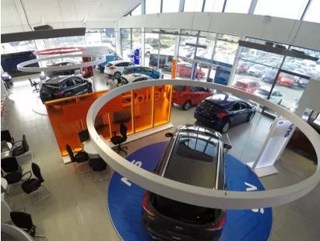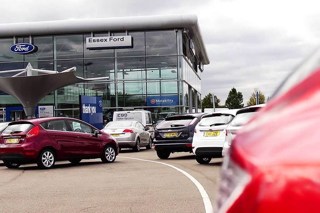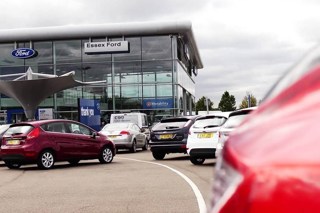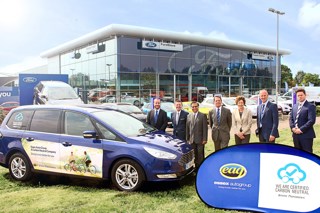Essex Auto Group was born as Essex Ford in 1989 when Philip Maskell had an opportunity to buy his first dealership, in Basildon, with a £3 million investment from venture capitalist.
Ten years later he bought out the venture capitalist. Several acquisitions on, the business rebranded as Essex Auto Group when, like many other retailers traditionally devoted to the Blue Oval, it expanded its franchise portfolio to take advantage of the broader opportunities on offer.
Mazda was first in 2004, then came Fiat, Kia, Seat, Volvo and Skoda. Maskell said multi-franchising was a logical step for a business operating five Ford dealerships between Southend and the M25.
Essex Auto Group was born as Essex Ford in 1989 when Philip Maskell had an opportunity to buy his first dealership, in Basildon, with a £3 million investment from venture capitalist.
Ten years later he bought out the venture capitalist. Several acquisitions on, the business rebranded as Essex Auto Group when, like many other retailers traditionally devoted to the Blue Oval, it expanded its franchise portfolio to take advantage of the broader opportunities on offer.
Mazda was first in 2004, then came Fiat, Kia, Seat, Volvo and Skoda. Maskell said multi-franchising was a logical step for a business operating five Ford dealerships between Southend and the M25.
South Essex had been a Ford heartland for decades, given the tens of thousands of people historically employed there at carmaker’s production facilities.
Today, despite rationalisation, the region is still strong for Ford sales, with the Dunton Technical Centre near Basildon, Dagenham engine plant and the Ford of Britain national sales company’s home near Brentwood. However, in the light of fewer Ford employees to sell and service, Maskell faced a conversation with his carmaker partner.
“The good news for Ford was that we’ve retained all five points of representation for the brand here. My strategy was always to retain the representation and renew facilities through relocations and development of existing sites.
"Without multi-branding we couldn’t keep all five points going. The area would have only sustained three.”
Nevertheless, he emphasised that Ford remains core to Essex Auto Group’s business. Every fourth new car registered in the territory is a Ford, and the 91st-placed AM100 dealer group still derives 70% of its £105m turnover with the brand.
Its £7.5m dealership, on the doorstep of Ford’s Dunton R&D site, was built on land bought from the carmaker so as a courtesy Maskell insists on the property remaining a solus site.
“With seven sales brands, one or two of those at any point might be in a product down cycle or up cycle so by diversifying I’m spreading the risk. However Ford is paramount to the group.”
“We’ve studied the multi-brand model so as to be one of the best examples of doing it right,” Maskell said.
Each new addition was considered slowly and deliberately, to ensure it complemented the existing business and plan the additional infrastructure and management necessary.
It was three years before Kia was introduced, and four before Fiat.
[page-break]Multi-million pound investments have been made at each location, which he described as a cold-start for each new brand.
The spend is for the long-term – his expectation is for each cold-start to take at least five years to reach boiling point.
Essex Auto Group won’t market its non-Ford brands to existing Ford customers – it wants the buyers for its other brands to be incremental; for those brands to develop on their own merit.
Maskell compares his showrooms to boutique department stores, each benefiting from the broader choice of products on offer and each becoming a destination for a variety of customers.
At Southend, for example, a £1.5m refurbishment means customers enter a central corridor from which Ford, Seat, Fiat and Kia showrooms are all accessible.
Yet all conform to the respective brand’s dealer standards, and each brand has a totem in full view of traffic on the A127 gateway into Southend.
At Rayleigh, the dealership representing Ford, Mazda and Skoda for sales and Jaguar and Volvo for service is in a prime spot beside a major supermarket.
To gain approval for the £4.2m development required close co-operation with the local council – to the extent that Essex Auto Group donated land for the construction of the town’s fire station next door.
Another sign that Maskell ensures the business is visible in its community is its title sponsorship of the Essex Auto Group Graham Gooch Cricket Centre at Chelmsford – exposing its brand to the parents of thousands of cricketing schoolchildren.
“We’re a first generation business, an emerging regional group. We’re not trying to take over the world, and we understand our limitations. To be a strong regional is our ambition.”
Maskell dislikes the term dealer – he describes his business as a genuine retailer, and said private buyers and local SMEs are its typical customer base.
The company is committed to making it easier for the customer to do business. One example is the parking assistant at every Essex Auto Group site.
On arrival at a dealership, the customer is directed to a suitable parking space and welcomed, Maskell admitted that it was a cost for the business.
However, he is convinced the premium-level experience it helps to create is more than worth the investment.
Each dealership has customer wi-fi in the showroom and also has a covered pavilion in its used car forecourt to provide a comfortable environment for browsers.
It is clear that as a relatively small regional business Essex Auto Group has not been afraid of investment.
It developed its own dealer management system, and employs two full-time programmers to make continual improvements to its IT systems.
It has a support centre next door to its bodyshop in which it makes and receives customer calls for all its sites, including Motability and fleets through 1Link, with missed calls in busy periods picked up automatically by telephone overflow service Armchair.
The centre also handles the group’s marketing, under the leadership of marketing director Matt Brown, who joined in 2008 from online marketer Global Beach.
Support centre operatives can view an amber alert system to monitor deferred maintenance work for follow-up.
The centre also handles the group’s trade parts sales to independent motor traders, and has added a live chat facility to the group’s website, which now is the channel of choice for 60% of online enquiries.
Brown tracks and measures all aspects of the group’s marketing and said levels of engagement are increasing, as are conversion rates.
“The trick is to show people there is more to go at if we can convert more of what we’ve got already,” said Brown.
“Every lead generated has to be followed up and optimised. There’s no hiding place for staff.”
It’s a signal of the robust management, processes and systems driving the business, but these get respect from the staff, many of whom have been with the business for years.
"Maskell recognises that longevity and loyalty from employees is essential for growth, and encourages that with rewards and recognition.
Maskell concludes: “I’m a tough boss, I’m demanding and expect people to deliver, but I believe you get what you earn as a boss by driving people.”
'Ford is a great franchise, together we can make it better'
Philip Maskell feels driven to improve the fortunes of his fellow franchised dealers.
From 2004 to 2007 he was the founding chairman of the Retail Automotive Alliance, a joint venture of 22 regional Ford dealer groups designed to pool their combined buying power to negotiate better rates on key supplies such as oil, remarketing and IT systems.
Members make annual savings of hundreds of thousands of pounds.
Today, as chairman of the Ford National Dealer Council, a role he returned to in 2010 for a second term, Maskell is passionate about the manufacturer and the way franchise owners and the carmaker’s UK management are working together to improve fortunes. He describes it as a best practice model.
“I’m proud of what the dealer council is doing with Ford’s senior management.
"The committee works closely with them, and a sign of the co-operation is that last year Ford was the first major manufacturer to sign up the whole network on the new agreements.
"The network has retained most of the rights under the old contracts.”
He said another sign of its co-operative approach was that around 80 franchise owners met with Ford of Britain’s directors at the end of February to discuss ways to progress their partnerships and profitability.
The meeting was extremely constructive, Maskell said. “Together we want to make the ownership of a great franchise even better.”
He praised Ford’s current product range as the best in its history, with exceptional standards of design, engineering and quality, as proven by a dramatic reduction in warranty cost.
The dealer council fully supports the work started in 2010 by preceding Ford of Britain managing director Nigel Sharp to challenge the discounting culture long associated with the volume manufacturers.
Maskell said it will take time, because it requires a change of mindset. “In fairness to Ford, it wants to maintain market leadership. We’re totally behind that because it’s a volume dealership model.”
Ford has been heavily engaged with the network with a dealer support plan covering a diverse variety of actions to reduce cost and enhance revenues.
An example is new car stock held centrally by Ford rather than ring-fenced by dealers, to protect the network from the cost of overage and excess units and to allow all dealers to sell from the pool.
There is room for improvement.
The council believes competition between network members is distracting dealers from optimising their real conquest sales for Ford.
Winning customers from other brands will bring better dividends and secure more volume for the manufacturer, profitably strengthening its position as a clear market leader.
“There’s a lot of wasted money in intra-brand competition. It’s a concern for the franchise and the industry as a whole,” Maskell added.
“With the retail market flat, that’s a serious concern.”
Login to continue reading
Or register with AM-online to keep up to date with the latest UK automotive retail industry news and insight.




















Login to comment
Comments
No comments have been made yet.